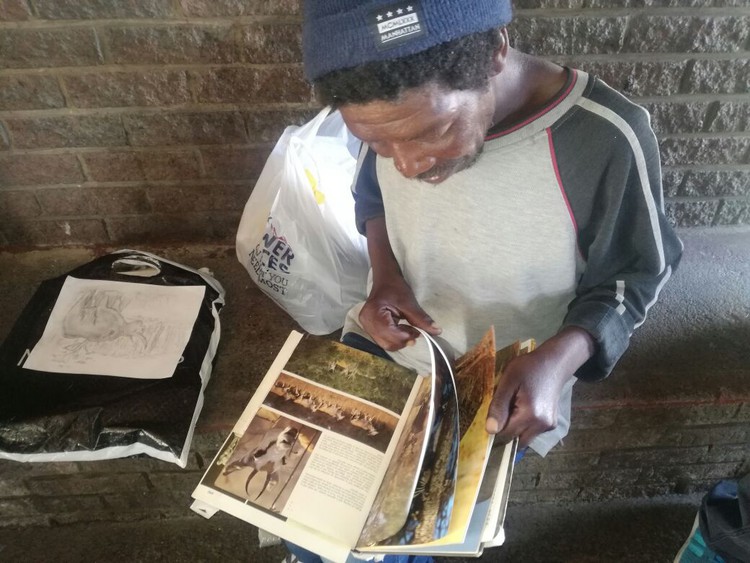
Phindile Nobhanda looks for things to draw. He says that drawing helps him forget that he lives in a toilet. Photo: Thembela Ntongana
18 January 2018
In Gonubie, East London a group of homeless people have made a home out of public toilets. They all come from different areas of the Eastern Cape. They came to East London in the hope of getting jobs.
There are currently 14 people living there. When GroundUp visited many had gone to work at the beachfront while others who had started working earlier, like Phindile Nobhanda, were resting.
Many work as car guards at the beachfront during busy days. On quiet days they look for odd jobs like gardening.
Nobhanda sits in one corner with an art book. He says he is looking for the next thing to draw. “Drawing helps me keep my mind off things. I sometimes forget I sleep in a public toilet when I am drawing.”
Originally from Nqamakwe, he moved to East London in the early 1980s and lived in an informal settlement in Cambridge with his partner. He says when he lost his job at a construction company his relationship also ended and he had to move out in 2006.
“I looked for a place. At that time I was unemployed. Even when I had vacant land I had no money to buy material to build or money to rent a shack,” he says. “I also have three children so if I got a job somewhere I had to send money to them as well as feed myself. The streets became a better option because I didn’t have to rent.”
He has never been able to find a fulltime job since. All three of his children stay with their mothers. “Never in my life did I think I would stay on the streets but it has happened. But I know someday I will be out of here.”
Simphiwe Khokha from Qumrha sleeps next to Nobhanda. Their belongings are neatly folded in one corner. He has been living on the streets for four years. He came to East London with no family. He was 42 at the time. “For years I looked after my parents and we survived on their pension. When they both died I had to leave home and go look for a job. I came here but things were not as easy as I thought they would be,” he says.
He first stayed the city centre, and a year later moved to Gonubie. He has only been home once in the past four years. “I have no close relatives here, so the streets are the only home for me.”
Khoka says: “I miss home, I miss sleeping in a comfortable bed in a secure house but what will I eat when I go home? There are no jobs there.”
Twenty-two-year-old Zukisa (not his real name) lives on the East London Esplanade with no protection from the rain or the cold fronts that come from the sea. He only has one blanket, two T-shirts, one pair of pants and a jacket. He has been on the streets for two years.
Zukisa stayed with his extended family in Mdantsane but says he moved when he could no longer ignore the treatment he was getting. “I stayed with my mom’s family because my mother died when I was 12 and I do not know my father. I was hoping to get a job so I could move out of the place but it was difficult without matric and I was tired of feeling like a burden to people.”
He says he left home without telling anyone and ended up on the streets.
He works as a car guard. While talking to GroundUp, he was drying his clothes after the previous night’s rain. “We have no shelter here. Even if you run to sleep under a tree you still get wet.”
These are three of the many homeless people in East London who sleep in public toilets, business doorways and bushes. They agree that a shelter would bring some relief.
“If there was a shelter I would know that on rainy and cold days I could work and have money to pay for the homeless shelter, because this is not good. We can get sick sleeping outside in the cold with wet clothes,” says Zukisa.
Department of Social Development spokesperson Mzukisi Solani told GroundUp that the department had no shelters. Asked for the number of homeless people in the city, he suggested we contact organisations in East London that deal with homeless people to get the number. Solani has not responded to various attempts by GroundUp to find out whether the Department has any budget and programmes to assist homeless people.
Michelle Kerr of the Wings Shelter, which was established in 2014, says her organisation does not receive any help from the Department of Social Development. It depends on private companies for donations. The organisation distributes food, toiletries and clothing to homeless people.
They also work with other organisations such as the Salvation Army which provides a cooked meal for homeless people every Thursday. Kerr says the Salvation Army alone feeds over 100 homeless people. “There are hundreds of homeless people. Each time we go out we meet new people on the streets. In December last year, four city churches did a Christmas meal for the homeless. Over 260 people arrived for the meal and that was only those who had been given a ticket to attend.”
“So I can’t say for sure but I don’t think it’s any less than 400 to 500 people,” says Kerr. She says they have not found any premises to run a homeless shelter but are hoping to do so this year.
“We have gone to Buffalo City municipality but they don’t have any buildings for us. We have approached some property developers but have had no positive response from them,” says Kerr.